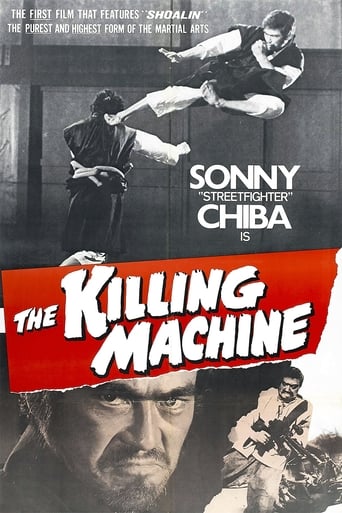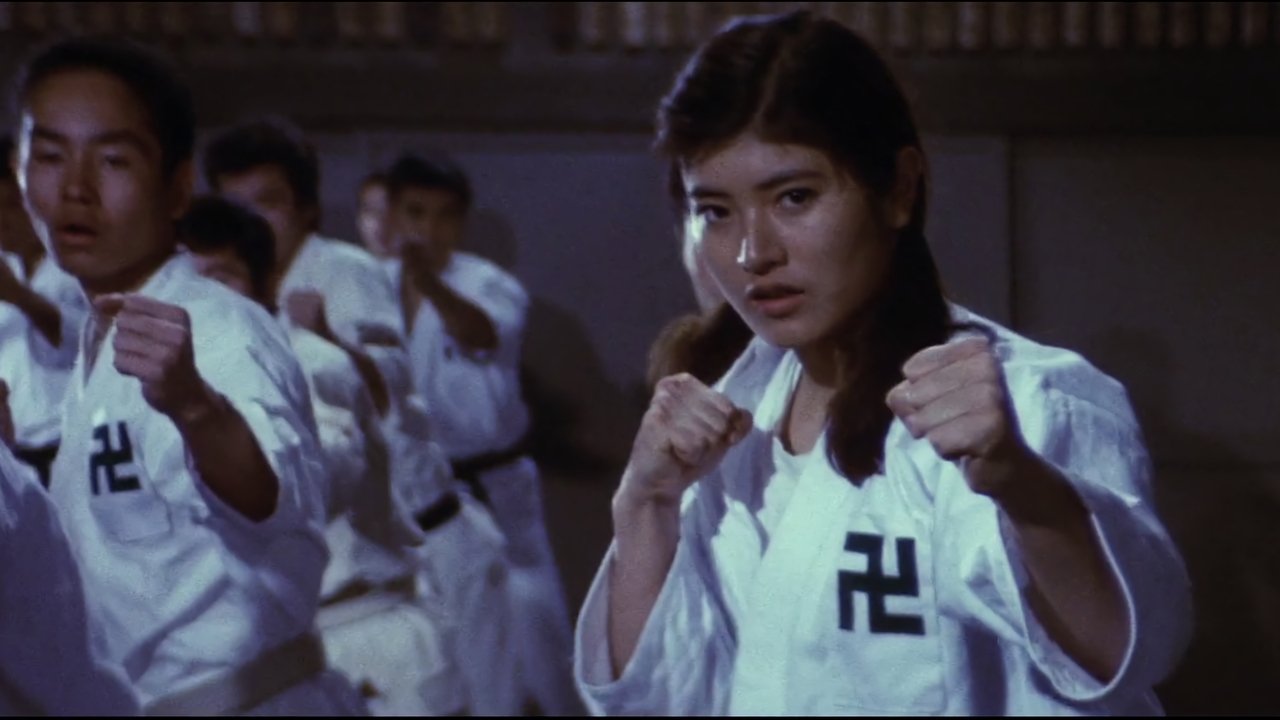seveb-25179
Sonny Chiba's masterpiece? Inspired by the life of an actual person.
Sonny's movies are often disparaged by serious martial arts fans for having camera work that obscures the technique of the martial artists during fight scenes, but most agree this one strikes the right balance.
For myself, I think the Japanese directors of this period are always aspiring to a higher level of artistic expression than their Hong Kong equivalents (perhaps due to the recognition accorded to Akira Kurosawa?) but often their ambition outstrips their talent.
However not in this case.
Being a period piece (post WW2) we are spared (or deprived, depending on your point of view) the usual quirky Japanese fashion statements, which have seen Sonny kicking ass in an assortment of outrageous hats, goggles, puffy shirts and fishnets in other movies.
The film is set mainly in Japan during the period of American occupation after WW2, so for the non-Japanese viewer, the main obstacle to enjoying this movie is trying to relate to the concept of feeling any sympathy for the Japanese people's suffering, in light of the many heinous atrocities they committed during the war.
Sonny begins the movie as a secret agent, kicking the ass of dirty Chinese guerrilla fighters, who are misguided enough to resist the heroic Japanese army of occupation, I mean liberation.
Later, on a train journey, he kicks the ass of some despicable Korean carpetbaggers, who are gleefully lording it over their former oppressors, I mean emancipators.
Then he brings swift and painful retribution to a couple of arrogant American soldiers in a jeep, who are driving around in a reckless fashion and inadvertently run down a hapless Japanese child.
However Sonny is at pains to point out, to a local official in a later interview, that he also told off Japanese officers and soldiers when he saw them mistreat the Chinese (but stopped short of actually kicking their asses it seems).
So for the foreign viewer it may be easier to enjoy the movie as form of dystopian science fiction film, where a conquered people, shocked and disoriented, their society completely dislocated, struggle to come to terms with their fall from grace.
Putting aside the right and wrong of the war itself, where some may suggest, the Japanese deservedly reap what they sowed, the suffering on a human level is universal.
A young woman who has been raped by the bestial Russians, is driven to try and become a prostitute in order to feed herself and her younger brother, until Sonny recues her from the harassment resentful regulars.
A despairing drunken man, who has been searching for his wife among the displaced, eventually finds her and his son, only to learn that she has remarried, thinking he was dead, so he walks away rather than make her life more complicated.
A man who has lost his will to live after having his arm chopped off regains his self respect after being given a good slapping by Sonny and told to harden up.
This film contains considerable raw emotional depth!
Mad Max-like, Sonny wanders through this wasteland of shanty towns and subways tunnels, dominated by Black marketeers and proto Yakuza, taking care of lost children and dispensing random vigilante justice.
Eventually he realises he can't redeem the Japanese National spirit alone and begins preaching his message of salvation and rebirth through martial arts to any who will join him.
Along the way he also kicks plenty of corrupt Black market and Yakuza ass, including what, for many, is the ultimate Sonny Chiba moment, where he cuts off a rapist gangster's privates with a pair of scissors!!
Then he turns to the audience and hefts them in his palm appraisingly, before tossing them onto the floor, where upon a dog trots in from stage right and sniffs at them before happily wolfing them down!!!
Woodyanders
1946. Martial arts master Doshin So (Sonny Chiba in fine fierce form) returns home to Japan after serving as an undercover spy during World War II. Doshin soon establishes himself as a protector of homeless orphans, opens a Shaolin martial arts school, and declares war on a nefarious black market racket.Director Noribumi Suzuki, working from a tough-minded script by Isao Matsumoto, relates the gripping story at a steady pace, maintains a harsh gritty tone throughout, doesn't skimp on the bloody'n'brutal violence, and stages the karate fights with savage aplomb. Moreover, this film offers an interesting depiction of the tattered mess of post-World War II Japan. Naturally, Chiba handles his chopsocky duties with characteristic ferocious brio: Sonny breaks limbs, cuts a rapist's offending weapon off and feeds it to a dog (!), and, of course, takes out dozens of opponents all at once. Better still, Chiba even gets to show a more tender and caring side in several touching scenes with both the orphan kids and a down on her luck prostitute. Recommended viewing for Chiba fans.
wanderingstar
"The Killing Machine" undoubtedly did not make the short list for foreign films up for Oscars in 1975, but for Chiba fans, this is pure gold.It's 1945, and Chiba is a spy in the Japanese Imperial Army, one of the many "disillusioned" young men after Japan's unconditional surrender. The story takes him from the poor streets of post-war Japan, taking care of homeless kids, to founding a karate school which provides a bulwark of purity against corrupt drug traffickers.The campy hokeyness is best exemplified in the first scene, when Chiba is spying on Chinese commanders in a nondescript house at the front. He is discovered, fights his way out, and in the split second change in scene, stumbles into a Japanese office, like it was located in the very next room (hey, do you think the two sets were side by side????).But this film contains some great fight scenes. Back kicks, devastating punches, spurting limbs, and genitalia severed with scissors and fed to the local stray dogs abounds. In my fav scene which really exemplifies Chiba's style, he lays waste to an opponent by bending his arm back and breaking it, and it flops backwards at a grotesque angle. Then, as though this wasn't enough, he takes the time to turn the guy over and break his other arm! Classic!!! who can argue with this type of genius!!Definitely, definitely see this, if possible with some beers and a bunch of friends with the same taste in campy 1970's martial arts films.
wesle827
In the movie master So, has many trials to over come he has to rebuild and try to start a school, the action corresponds with the story real well. He has to learn how to love to truly know what Shaolin kung-fu is all about.it was a good story


 AD
AD



